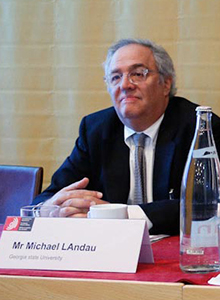Landau Gives IP Law Presentation to E.U.
As the world gets smaller, intellectual property laws across borders increasingly collide, Georgia State University College of Law Professor Michael Landau says.
 Internationally recognized experts on intellectual property including Landau recently gathered in Brussels on Nov. 13-14 for a conference, "The Essentials of IP for European Officials."
Internationally recognized experts on intellectual property including Landau recently gathered in Brussels on Nov. 13-14 for a conference, "The Essentials of IP for European Officials."
As the only American presenter, Landau spoke to a worldwide assembly of intellectual property experts about the differences in copyright, patent and trademark laws in the United States compared to the European Union and the movement toward convergence under the Transatlantic Trade and Investment Partnership.
The Transatlantic Trade and Investment Partnership, under negotiation with the United States and the European Union, is designed to drive growth and create jobs. Those negotiations include creating unified intellectual property laws. The next round of Transatlantic Trade and Investment Partnership talks take place the week of Dec. 16 in Washington, D.C.
"We're moving in the right direction but it will take time before there's complete harmonization," Landau says. "There are several sticking points."
Among them, fair use is a major one, Landau says. Fair use is fairly flexible in the United States and allows many otherwise infringing uses because of the First Amendment, which has a profound effect on intellectual property law, he says.
Another issue is geographical indications, important to the wine and cheese producing regions of the European Union. The United States does not expressly recognize them though the European Union does.
The trademarks system also has implications, Landau says. Instead of "famous marks," which are recognized in the European Union, the United States' Lanham Act, does not recognize them. Trademarks in the United States are based on a use system instead of a registration system, Landau says.
"There are differences," he says. "The question is, will the U.S. make the changes or will the E.U.?"